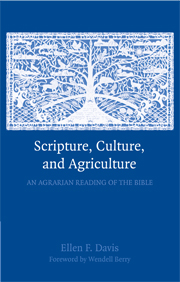Book contents
- Frontmatter
- Contents
- Foreword by Wendell Berry
- Acknowledgments
- Abbreviations
- Introduction
- 1 Rupture and Re-membering
- 2 Reading the Bible Through Agrarian Eyes
- 3 Seeing with God: Israel's Poem of Creation
- 4 Leaving Egypt Behind: Embracing the Wilderness Economy
- 5 A Wholesome Materiality: Reading Leviticus
- 6 Covenantal Economics: The Biblical Case for a Local Economy
- 7 Running on Poetry: The Agrarian Prophets
- 8 Wisdom or Sloth? The Character of Work
- 9 The Faithful City
- Postscript
- Notes
- Scripture Index
- Index
2 - Reading the Bible Through Agrarian Eyes
Published online by Cambridge University Press: 05 June 2012
- Frontmatter
- Contents
- Foreword by Wendell Berry
- Acknowledgments
- Abbreviations
- Introduction
- 1 Rupture and Re-membering
- 2 Reading the Bible Through Agrarian Eyes
- 3 Seeing with God: Israel's Poem of Creation
- 4 Leaving Egypt Behind: Embracing the Wilderness Economy
- 5 A Wholesome Materiality: Reading Leviticus
- 6 Covenantal Economics: The Biblical Case for a Local Economy
- 7 Running on Poetry: The Agrarian Prophets
- 8 Wisdom or Sloth? The Character of Work
- 9 The Faithful City
- Postscript
- Notes
- Scripture Index
- Index
Summary
Rabbi 'Aḥai ben Josiah says:
He who purchases grain in the market place, to what may he be likened? To an infant whose mother died: although he is taken from door to door to other wet nurses, he is not satisfied.
He who buys bread in the market place, what is he like? He is as good as dead and buried.
He who eats of his own is like an infant raised at its mother's breast.
At the beginning of the creation of the world, the Holy One, blessed be he, began with planting first.
For it is written:
“And the Lord God planted a garden eastward in Eden”
(Gen. 2:8)You too when you enter the land shall engage in nothing but planting. Therefore it is written:
“And when ye shall come into the land, ye shall have planted…”
(Lev. 19:23).Though he works and worries, the farmer
never reaches down to where the seed turns
into summer. The earth grants.
(Rainer Maria Rilke)ETHICS AND EXEGESIS
The first essay in this volume suggests that the contemporary agrarian writers may help us re-member a way of life that honors the wholeness of creation. Now I want to make a stronger and therefore riskier claim: Reading the work of the contemporary agrarians can make us better readers of Scripture. The exegetical project begun in these essays is developing as a conversation between critical biblical study and contemporary agrarian thinking, and the one is as indispensable to it as the other.
- Type
- Chapter
- Information
- Scripture, Culture, and AgricultureAn Agrarian Reading of the Bible, pp. 21 - 41Publisher: Cambridge University PressPrint publication year: 2008



